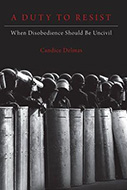A Duty to Resist: When Disobedience Should be Uncivil

Author: Candice Delmas
Publisher: Oxford University Press, 2020. 316 pages.
Reviewer: Michael Sevel ǀ March 2022
One dominant theme in broadly liberal legal and political philosophy over the last half century has been examination of the content, scope, and limits of the moral obligation a person has simply as part of a political community governed by law. The debate is often said to be about the nature of ‘political obligation,’ though the interpretation usually given to that notion has been quite narrow, as one about ‘the duty to obey the law.’ The actual substance of the debate, however, has been even narrower. Most contributors have had virtually nothing to say about two of the three concepts: about the nature of law and its institutions, and obedience, what is taken to be the appropriate response to law when reasonably legitimate. Rather, the debate has been concerned almost entirely with the nature of the duty itself. In a literature as voluminous as any in social and political philosophy, a relatively modest number of views have emerged. It has been argued that we have a duty to obey the law based on a ‘natural duty of justice’ to support just or nearly just institutions, and to improve them when possible; or a duty based on the fact that we benefit from a scheme of cooperation secured by law and therefore owe it to our fellow citizens to sustain it; or that obeying discharges an alleged ‘Samaritan duty’ to rescue those in peril, if doing so comes at no unreasonable cost to ourselves, which, in a reasonably just state, the law does; or, finally, a duty based on the very fact of membership in a political community, and the special association we have to our fellow citizens living under the same legal system.
If there is an argument that unifies A Duty to Resist, it is that these four accounts of the duty to obey the law all somehow support a further duty, the duty to resist, which turns out to be a collection of duties that includes not only civil, but also uncivil, principled, and sometimes even violent disobedience in the face of injustice. And yet, the precise connection between these familiar arguments for a duty to obey the law and Delmas’s revisionary duties is never made clear. We are told that the duties to resist rely “on the same grounds” (20), “rest on some of the same grounds” (51, my emphasis) and are “based on” (223) traditional arguments for the duty to obey the law; that such duties are “a core part of” (17) our political obligations, alongside the duty to obey; that our political obligations “encompass” (219) not just the duty to obey, but the duties to resist injustice; that these duties are a “friendly extension” (1) of traditional accounts of the duty to obey the law; and that these duties “derive from well-established norms of liberal political morality”, presumably the norms reflected in those traditional accounts (225).
Each of these remarks (and there are others) suggest very different pictures of how these duties hang together in a robust account of the relationship between people and their governments. The strongest reading of them is that the traditional accounts of political obligation imply, entail, or somehow contain within them, the duties to resist injustice. Were this claim vindicated, it would be a dramatic result. It would be surprising enough that, for example, Rawls’s account of a natural duty of justice to obey the law may sometimes require one to engage in public violence, rioting, or even acts of terrorism, as Delmas claims the duty to resist may require (262 n51). But that all four of these traditional sorts of arguments to obey the law imply a duty to, under the right conditions, engage in terrorism and violence would be remarkable indeed – so remarkable that it would call out for an explanation, going to the very structure of political morality, beyond any mere “basic liberal commitments” (225). But Delmas does not seem interested in such an explanation. A far weaker version of the book’s master argument seems to emerge later, that the alleged duties to resist injustice are not strictly incompatible with (and are “friendly extensions” of) those four traditional arguments. A traditional liberal (among others) need not betray her deepest commitments by accepting, and acting on, a duty to resist. Needless to say, these are very different claims, and together suggest many other, more moderate ones between them. But a persistent lack of clarity as to which of these claims is supposed to be at the heart of the book’s central argument pervades the whole.
One reason for the unclarity is perhaps that Delmas’s concerns lie elsewhere. The book is replete with putative examples of injustice. Most chapters begin with a cinematic description of a particularly apt example: protests against police brutality in France, the Panama Papers, 1950s Mississippi under Jim Crow, protests against sexual violence in Bangalore. Generally, the use of concrete examples in philosophy are welcome. Too much legal and political philosophy, even that which aspires to be politically relevant, has often proceeded in idealistic abstraction, seemingly far from the circumstances of ‘lived experience.’ But the sheer number of examples adduced in the book, along with the author’s often terse but unequivocal moral opinions about them, gradually overtake the discussion of political obligation and take center stage themselves: Edward Snowden, Pussy Riot’s guerrilla performances, ‘DDoS’ attacks, Cédric Herrou, anti-trans bathroom policies in North Carolina, the Deacons for Defense and Justice, the Lavender Panthers, the Fugitive Slave Act and Underground Railroad, hunger strikes in Northern Ireland, Banksy’s guerrilla street art, Saudi female drivers, the Freedom Riders, ecosabotage, ‘burkini’ bans in France, among many others, are each referenced for some illustrative purpose. Even a highly politically engaged and informed reader may be forgiven for not knowing the details, history, and cultural contexts of all of these examples, which Delmas often does not supply, so that one may have to look them up oneself in hopes of understanding Delmas’s intended use of them. But of course that may be the very point: to not only raise awareness about these alleged injustices, and the organized responses to them, but perhaps also to encourage in the reader a certain general moral attitude about them.
By the penultimate chapter, philosophical questions have been eclipsed by the author’s practical and political directives: “together we think; together we resist” (199). The second-person plural would seem to refer to the author and anyone who agrees, not only with the philosophical arguments supporting the duties to resist injustice, but also with the many moral opinions that Delmas expresses throughout the book: for example, that Edward Snowden should be praised for leaking classified government documents relating to state surveillance programs (54, 99, 219), that the proposed Stop Online Piracy Act in the United States should have been protested (89), that American athlete Colin Kaepernick protests respectfully (44), that solitary confinement of prisoners is disrespectful (77), that the French banlieues riots of 2017 may be justified (48), that those who released the Panama and Paradise papers were fulfilling their duty of justice (73), as were those who conducted cyber-attacks in 2010 against Paypal and others (97, 268 n48), and many more. Again, the moral and factual complexities of these diverse cases are never studied; rather, the case and the author’s evaluation of it are interjected as illustrative examples of some point at hand.
The confidence with which Delmas presents these varied opinions is motivated by a view mentioned early in the book, taken from Amartya Sen, that “it is easier to identify injustice than to say what justice consists in” (15). This idea surfaces from time to time in twentieth century political theory, particularly (but not only) among socialist and progressivist writers, and is used for a wide variety of practical and theoretical aims. As political rhetoric, it may in fact be an effective way to further one’s cause. But as a general principle of moral epistemology, it has little going for it. It seems to suggest the sort of crude intuitionism – in this case an oddly asymmetric, half-hearted one – which many philosophers over the twentieth century toiled against, and succeeded in refuting.
At least since Nietzsche declared that every philosophy is “a species of involuntary and unconscious autobiography”, the conception of philosophy as a search for timeless, transcendent answers to enduring questions has become ever more in doubt. And yet, most philosophers assume some semblance of objectivity for their theories, though they be bound by culture, tradition, and conceptual scheme. Delmas seems uninterested in even that, and in the end settles on a direct call to political action, and to her turn of mind. In that respect, perhaps the book is best taken as itself a kind of political activism – in its own way, an act of resistance to perceived injustice. And as such it is a timely and relevant work. But like any timely book, it is that – until the moment passes.
Michael Sevel, Senior Lecturer in Jurisprudence, University of Sydney


